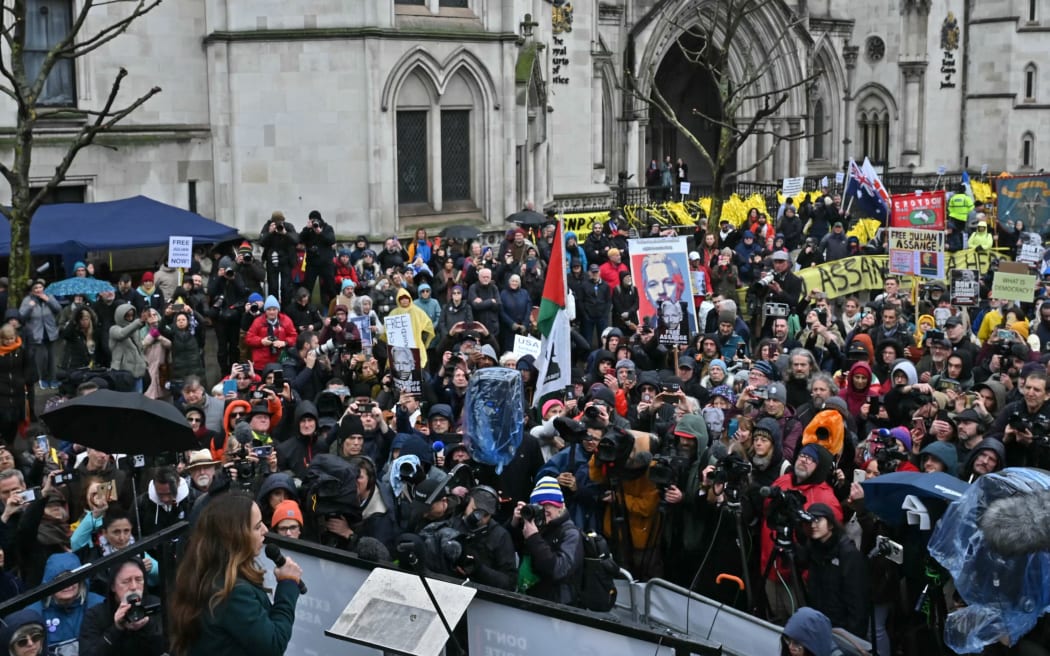By Riley Stuart in London, ABC
[xh]People 'disappeared' after Assange published hacked documents, court hears

Police watch over protesters outside the Royal Courts of Justice in London before Wednesday's hearing, as wife of WikiLeaks founder Julian Assange, Stella Assange (lower left) addresses supporters and media. Photo: AFP/ Justin Tallis
People living under authoritarian regimes "disappeared" after Julian Assange blended hacking with reporting, "stole vast amounts" of classified documents and published them on his WikiLeaks website, a court has heard.
Assange, an Australian, is fighting extradition from Britain to the United States, where he has been charged with numerous offences under the espionage act.
He's been in London's HM Prison Belmarsh since 2019, and is running out of legal avenues to avoid being sent to America, where he could face up to 175 years behind bars if convicted.
On Wednesday, a hearing at the Royal Courts of Justice on The Strand was told Assange had "exposed to the world the unredacted names of human sources" who had helped the US.
He has been charged with 18 criminal offences in the US, including obtaining, receiving and disclosing classified information.
All of the charges relate to material published on Assange's WikiLeaks website in 2010 which detailed evidence of, among other things, war crimes committed by US forces in Iraq and Afghanistan.
The information was given to him by soldier-turned-whistleblower Chelsea Manning, who was subsequently jailed for 35-years. She had her sentence commuted to seven years by then-US president Barack Obama, and was freed in 2017.
Assange's legal team had earlier argued the Espionage Act had never been used to prosecute publishers before.
But on Wednesday, Barrister Clair Dobbin KC, acting for the US, told the court Assange and his WikiLeaks platform were not "ordinary journalists or publishers".
She said Assange had encouraged Manning to "steal" classified documents and that lives had been put at risk by the Australian's decision to "knowingly publish the materials with the names unredacted".
"These are people who had to leave their homes, flee their homelands, because they had been identified in the state department cables," Dobbin told the court.
She said there were "individuals who have subsequently disappeared since the publication of the cables", adding: "Many of them lived in war zones or under oppressive regimes."
Assange running out of options
This week's hearing is Assange's last avenue in Britain's justice system to challenge the extradition.
He is asking the High Court of England and Wales permission to appeal a decision that would see him handed to American authorities.
The two judges who heard the matter have reserved their decision for a later date.
If Assange is successful, he will remain in custody while the High Court hears an appeal at a later date.
If he is not, his lawyers have flagged they will take the case to the European Court of Human Rights - although legally, it would be possible for British authorities to send the 52-year-old to the US before that.
Assange's lawyers had earlier in the hearing claimed he was being punished for leading a global opposition movement to the United States.
But on Wednesday, Dobbin KC made it clear the US was keen to get its man, pointing out the attempt to extradite him had spanned two different White House administrations.
"Nevertheless the prosecution of the appellant remains on foot," she said, because it was "based on law and evidence not political inspiration".
Assange has been behind bars since April 2019, when police arrested him inside the Ecuadorian Embassy where he had been holed up for seven years, claiming political asylum.
Seventeen of the 18 charges Assange is facing fall under the US Espionage Act 1917.
On Tuesday, Assange's team told the court that their client was not an American citizen and was not living or working in the US at the time of the alleged offences.
He had been granted permission to attend the hearings in person and via video link, but is too sick to do either.
Independent federal MP Andrew Wilkie was in London for the second day of hearings.
He has long campaigned for Assange to be returned to Australia and outside court said if the 52-year-old was sent to the US, it would be "a death sentence".
"The one man that I wanted to see, that I didn't see, was Julian Assange himself, he is too unwell to attend," Wilkie said.
"He's not well enough to be in Belmarsh prison at the moment, let alone well enough to be extradited."
The two days of hearings have concluded, and there is no timeline for a ruling.
- This story was first published by ABC

